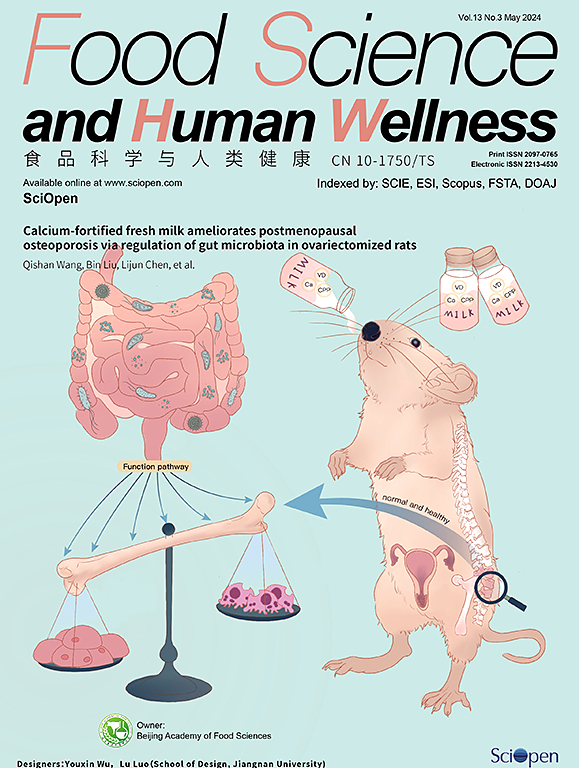基于过敏原特征肽的 UPLC-MS/MS 检测植物蛋白饮料的掺假情况
IF 7.4
1区 农林科学
Q1 FOOD SCIENCE & TECHNOLOGY
引用次数: 0
摘要
植物蛋白饮料掺假事件时有发生,其中隐藏的过敏原可能会给消费者带来健康问题。为此,建立了超高效液相色谱-串联质谱(UPLC-MS/MS)鉴别方法。对杏仁、花生、核桃和大豆进行水解,利用NanoLC-Triple TOF ms进行分离,利用ProteinPilotTM联合Uniprot对指纹图谱进行鉴定,筛选出16个特征肽。然后用UPLC-MS/MS对胰酶水解后的植物蛋白饮料进行分析。该方法与R2 >呈良好的线性关系;0.994 03。杏仁、花生、核桃和大豆的定量限分别为0.015、0.01、0.5和0.05 g/L。平均加样回收率在84.77% ~ 110.44%之间,rsd <;15%。将该方法应用于31种植物蛋白饮料的掺假检测,发现了掺假和假标现象。该方法可为植物蛋白饮料的认证提供技术支持,保护消费者的权益和健康。本文章由计算机程序翻译,如有差异,请以英文原文为准。
Adulteration detection of plant protein beverages by UPLC-MS/MS based on signature peptide of allergen
Plant protein beverage adulteration occurs frequently, which may cause health problems for consumers due to the hidden allergens. Hence, a novel method was developed for authentication by ultra-performance liquid chromatography-tandem mass spectrometry (UPLC-MS/MS). Almond, peanut, walnut and soybean were hydrolyzed, followed by separation by NanoLC-Triple TOF MS. The obtained fingerprints were identified by ProteinPilotTM combined with Uniprot, and 16 signature peptides were selected. Afterwards, plant protein beverages treated by trypsin hydrolysis were analyzed with UPLC-MS/MS. This method showed a good linear relationship with R2 > 0.994 03. The limit of quantification were 0.015, 0.01, 0.5 and 0.05 g/L for almond, peanut, walnut and soybean, respectively. Mean recoveries ranged from 84.77 % to 110.44 % with RSDs < 15 %. The developed method was successfully applied to the adulteration detection of 31 plant protein beverages to reveal adulteration and false labeling. Conclusively, this method could provide technical support for authentication of plant protein beverages to protect the rights and health of consumers.
求助全文
通过发布文献求助,成功后即可免费获取论文全文。
去求助
来源期刊

Food Science and Human Wellness
Agricultural and Biological Sciences-Food Science
CiteScore
8.30
自引率
5.70%
发文量
80
审稿时长
28 days
期刊介绍:
Food Science and Human Wellness is an international peer-reviewed journal that provides a forum for the dissemination of the latest scientific results in food science, nutriology, immunology and cross-field research. Articles must present information that is novel, has high impact and interest, and is of high scientific quality. By their effort, it has been developed to promote the public awareness on diet, advocate healthy diet, reduce the harm caused by unreasonable dietary habit, and directs healthy food development for food industrial producers.
 求助内容:
求助内容: 应助结果提醒方式:
应助结果提醒方式:


